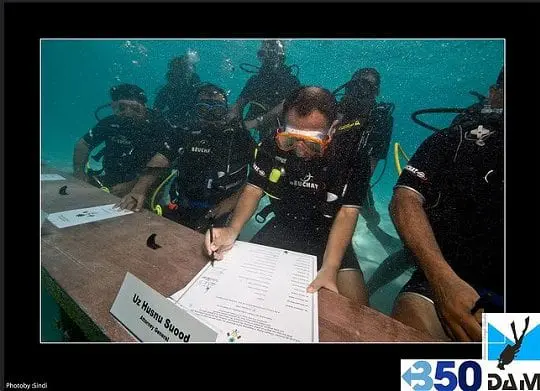[Originally published as When Hysteria is More Important than Science]
Sea levels have been rising since the early 1800s, and while satellites have only been measuring them since 1992, satellite measurements indicate that they have been rising at a fairly constant rate of 2.8 millimeters per year.

This is concerning to many people, especially the ones who live in countries like the Republic of Maldives, which is, on average, only 1.5 meters above sea level. In fact, the country is so concerned about the rising seas that in 2009, the nation’s cabinet held a meeting underwater, where they signed a document calling on all countries to reduce their carbon dioxide emissions. After all, it is thought that rising carbon dioxide levels in the atmosphere warm the planet, which in turn causes sea levels to rise. If sea levels rise too much, the Republic of Maldives will be lost.
Sensible doesn’t equal True
Now, of course, that kind of reasoning makes sense, but anyone who studies science should understand that things which make sense are not necessarily true. A lot of Aristotle’s notions (such as the idea that objects prefer to stay at rest) made sense, but science has demonstrated them to be false. In the same way, a lot of our modern theories (like quantum mechanics and relativity) make little sense, but experiments strongly support their conclusions (see here and here, for example).
Rather than giving into the hysteria, then, it is best to see what the data indicate.
Interestingly enough, while the data saying that rising sea levels will destroy countries like the Republic of Maldives makes sense, it is almost certainly not true.
I first wrote about this three years ago, when a group of researchers decided to study some of the islands around the Funafuti Atoll, which holds the island nation of Tuvalu. They found that contrary to the hysteria, the majority of the islands they studied have grown since 1897, leading to a net increase in the amount of land available.
And since then, the same research group has completed a more extensive study, which confirms their previous conclusion.
They have now examined all 101 islands that make up the nation of Tuvalu, and they show that overall, the island nation has gained 735,000 square meters of land during the past 40 years of sea level rise. 74% of the islands in the nation grew, while the rest shrank. This is despite the fact that the tide gauge in the area indicates that the sea level there has risen faster than the global average (3.9 millimeters per year as opposed to 2.8 millimeters per year).
Now please note that this is not because people are fighting the rising seas. As the authors note, only 11 of the 101 islands have permanent residents, and even on those islands, there are very few projects related to sea level rise. As a result, they are confident that natural processes are responsible for the growth of land area in Tuvalu. They also note:
Results challenge perceptions of island loss, showing islands are dynamic features that will persist as sites for habitation over the next century, presenting alternate opportunities for adaptation that embrace the heterogeneity of island types and their dynamics.
Based on the data, then, island nations should not be worried about being lost to the rising seas. Instead, they should learn how their islands are changing and adapt to that change.
Does this mean we should ignore rising sea levels? Of course not! We need to study them as closely as possible, so we can avoid the hysteria that is so common in the public arena. The more we focus on the data, the less important political shenanigans such as the one pictured at the top of this post will become.





